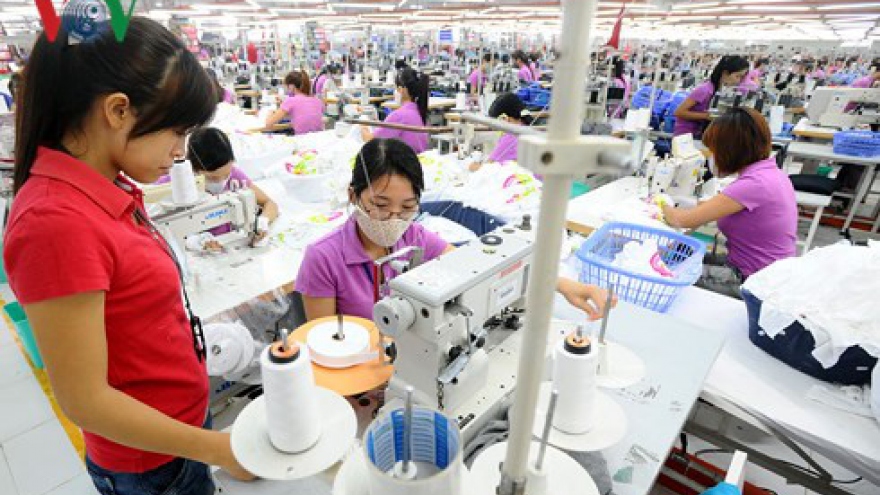Vietnamese firms urged to handle EVFTA non-economic barriers
VOV.VN - High-quality standards and non-economic barriers set by EU importers could force local firms to make drastic innovations with the aim of meeting these requirements and seeking higher productive capacity.
 |
| Local firms are advised to attach greater importance to overcoming non-economic barriers as stipulated in the EVFTA, particularly criteria set on environmental impacts and labor. (Source: Internet) |
The EU-Vietnam Free Trade Agreement (EVFTA) states commitments to services, investment, and public procurement, along with other regulations such as market openness and technical measures in certain fields.
The trade pact would also allow EU firms along with their products and services to make inroads into the Vietnamese market while in turn enabling local residents to purchase high-quality products imported from the bloc.
Strict quality standards required by EU importers, particularly with regards to the origin of products and non-economic barriers, require domestic enterprises to hasten the renewal of existing obsolete production processes and seek to apply cutting-edge technologies in a bid to improve the efficiency of production and product quality.
Nguyen Minh Ke, director of the Song Hong Aluminium Joint Stock Company, said that local firms must make more concerted efforts in a bid to meet the non-economic standards set by the EU.
Ke, who is also head of the association of Vietnamese aluminum profile for the north, unveiled that his firm has taken part in work alongside EU partners to make fact-finding tours of the firm’s production base. This aimed to make a detailed assessment on the origin of products and input materials, in addition to the whole manufacturing process. Other issues came up in relation to environmental impacts, land and air pollution, and how to effectively tackle them.
EU partners have closely monitored working conditions for laborers and their salary as well as the helping of food. Given this, the firm failed to gain a contract with EU partners following the assessment, as it obtained only 450 points out of a total of 1,000 due to their failure to meet non-economic criteria as required by the EU partners, although Song Hong aluminum products satisfied quality and price requirements, the director said.
He noted that fierce competition between domestic firms and foreign enterprises will be a greater issue once the EVFTA takes effect. Local companies will face strict competition from foreign opponents as their competitiveness remains relatively weak, especially in technology level and productive capacity.
In order to increase competitiveness and seek future success, local firms are in need of strong support and incentive policies by state management agencies, especially those dedicated to supporting fledgling industries, such as aluminum production.

Nguyen Hai Minh - vice chairman of EuroCham Vietnam.
Nguyen Hai Minh, vice chairman of EuroCham Vietnam, said that the country must consider the protectionism of domestic firms’ investment in producing goods when the EVFTA comes into force as tariffs will drop to zero per cent. This will therefore lead to little difference between domestically made goods and imported ones.
Regarding the automobile sector, the Government has been attempting to shield the domestic automobile manufacturing and assembly sector, he said, urging changes to be made to the long term approach.
He added that EuroCham said competition will serve to increase the capacity of Vietnamese firms and leverage their overall development, warning that increased competition is expected to further bolster linkages and technology transfer between foreign firms and their Vietnamese counterparts.
Economic expert Bui Kim Thuy said domestic firms should make full use of the advantages arising from the free trade agreements (FTA) that Vietnam has signed. They could choose to meet standards and optimize opportunities for their export to the FTA signatories by seeking ways to meet origin-related regulations of importers.
Vietnamese firms should make it a priority to develop products specifically for the domestic market, Thuy said, claiming that this serves as a good way to harmonize supply for both the domestic market and export markets.
Nguyen Duc Tung, head of the Private Sector Development Office under the Government’s Consulting Council for Administrative Reform, said the pace of the country’s international economic integration has been faster than that of institutions and policies. As a result, policies lag behind practices.
The office has planned to hold a working session with business associations in order to gain an in-depth understanding of the operations and obstacles of local firms. A relevant report could be submitted to Prime Minister Nguyen Xuan Phuc, Tung said.
He went on to say that enterprises should increase the application of advanced technologies into production processes so as to meet the criteria set by EU importers.
Economist Vo Tri Thanh suggested that firms should attach greater importance to overcoming non-economic barriers as stipulated in the EVFTA, while elaborating that they must meet not only quality standards, but also criteria set on environmental impacts and labor.


